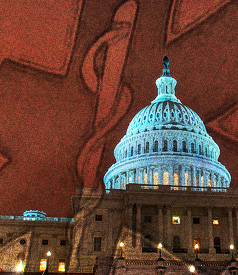Washington – The House of Representatives plans next week to vote on — and probably approve — a measure to strip health insurers’ antitrust protections, which will be Congress’ first step this year to try to overhaul the nation’s health care system.
However, the effort to remove the 65-year-old exemption is a small step that’s unlikely to have much direct impact on consumers, according to independent analysts.
“I don’t think this will have much effect. This is strictly political posturing,” said Paul Ginsburg, the president of the Center for Studying Health System Change, a Washington research group.
The House action is a way to jump-start Congress’ stalled health care effort. The House passed a sweeping blueprint for change on Nov. 7, the Senate approved its version Dec. 24 and the two sides had hoped to fashion a compromise by now.
That effort was derailed on Jan. 19, when Republican Scott Brown won an upset victory for the Massachusetts Senate seat held for 47 years by Democratic Sen. Edward Kennedy, who emphasized just before he died in August that health care was the cause of his life.
Brown heavily criticized the Democratic health care plans during his campaign, and his victory left Democrats in control of only 59 Senate seats, one short of the number needed to cut off debate.
Talks between House and Senate Democratic leaders have continued, but there’s been little apparent progress.
So House Democratic leaders decided to start moving pieces of the bill that they think can win approval, They also figured that simply having the debate — televised on C-SPAN and covered by the news media — would get the public re-engaged.
“This is very popular with the public. The market power of insurers has been blamed for increased health insurance premiums,” said Austin Frakt, a Boston University health economist.
However, rising costs, he said, stem from money passing through insurance companies to health care providers such as doctors and hospitals, and therefore “passing something focused on insurers like this is not going to do a lot. It’s not the reform that’s really needed.”
In fact, Ginsburg said, insurers already are prohibited from colluding to raise prices and from merging at will. They can, however, pool information about risks, and it can be argued that that helps them manage ways of controlling costs and even rates.
The bill faces rough prospects in the Senate. House leaders, however, say that ending the antitrust exemption will benefit consumers, and they hope that the plan boosts freshmen Democrats, generally the most vulnerable members in November’s elections.
Rep. Tom Perriello, D-Va., who faces tough Republican opposition in November, was the featured speaker at a news conference Friday to discuss the initiative, and he offered a rousing defense of the bill.
“Americans deserve to know who stands with them against the price gouging of middle-class and working-class folks,” he said.
Health insurers are fighting back.
“Health insurance is one of the most regulated industries in America at both the federal and the state level,’ said Robert Zirkelbach, a spokesman for America’s Health Insurance Plans, the industry group. “The real focus should be on addressing the rising cost of medical care, which is adding an unsustainable burden on families and small businesses.”
Insurance has been largely under state regulation since an 1868 Supreme Court ruling that it isn’t interstate commerce and therefore isn’t subject to federal regulation.
The court reversed that finding in 1945, but according to the nonpartisan Congressional Research Service, state regulation was so well established that Congress granted a federal antitrust exemption to those engaged in the “business of insurance,” leaving most authority with the states.
Before Midnight: Last Chance to Have Your Gift Matched!
Before midnight tonight, all donations to Truthout will be matched dollar for dollar up to $11,000! Thanks to a generous supporter, your one-time gift today will be matched immediately. As well, your monthly donation will be matched for the whole first year, doubling your impact.
We have just a few hours left to raise $11,000 and receive the full match.
This matching gift comes at a critical time. As Trump attempts to silence dissenting voices and oppositional nonprofits, reader support is our best defense against the right-wing agenda.
Help Truthout confront Trump’s fascism in 2026, and have your donation matched now!
